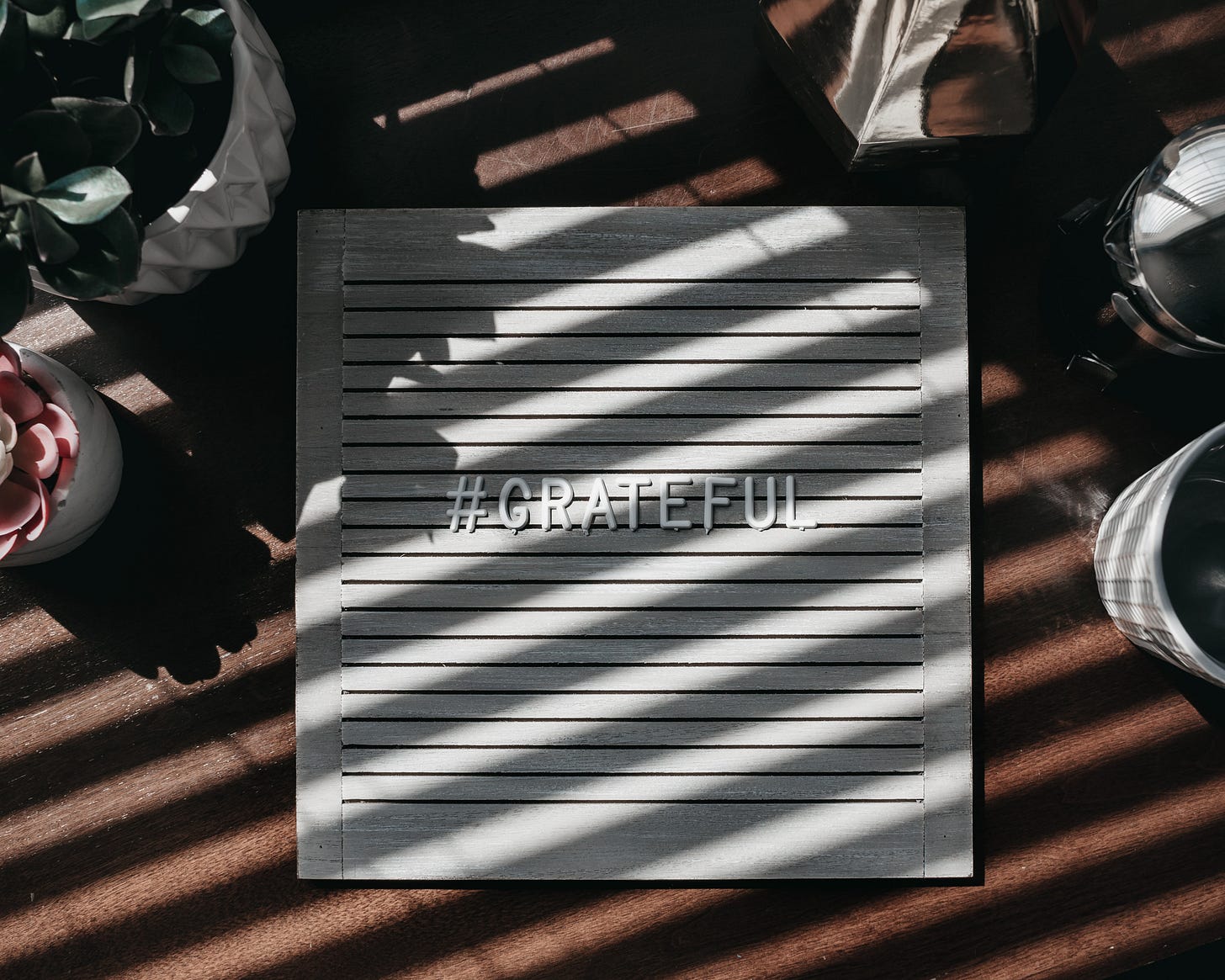Gratitude is easy when life is good
When life is hard, and being grateful is harder, it matters the most.
Things have been tough lately. It feels like I’ve been thrown back into the days of early grief — when every morning presents a battle to get out of bed, every solo car ride results in sobbing, every moment spent on social media leads to self-torture, and every night offers a spiral of negative thoughts. It’s been a blast!
I can’t quite pinpoint what exactly is causing this emotional turmoil, but I have a few theories:
Losing an hour of sunlight.
Good ol’ PMS.
Just grief?
The holiday season!
Chances are, my overwhelming sadness is a result of all of the above. It helps to be able to identify what’s causing my brain to feel like a giant, angry, dark cloud of doom, but that doesn’t change the fact that the cloud is still there. My challenge now is to remember that my negative thoughts aren’t reality, to maintain the healthy habits and behaviors that keep me functioning, and — let’s keep the metaphor going — to believe that the sun will return soon enough.
Whether or not you’re battling with PMS and grief, the double whammy of daylight saving time and the holiday season can have an adverse effect on many of us. To make matters worse, feeling down during this time of year just seems wrong — there’s guilt lurking around every corner. How could I feel so lonely when I’m surrounded by family? Why can’t I just be happy when I see everyone else’s joyful holiday photos? Why do I feel so sad when I’m supposed to feel thankful?
When life feels especially hard, being grateful can seem like a Herculean act. Being reminded that you’re supposed to be thankful can make the struggle to find gratitude even harder. But, I’m here to gently encourage you (and remind myself) that it works. As annoying as it might be to read yet another thankfulness guilt-trip, bear with me: Gratitude saved me last year. Sometimes I kept a daily gratitude journal; other times, I’d force myself to mentally list things I was grateful for instead of falling deeper into a rut of self-pity. It took lots of patience and practice, but the regular routine of thankfulness helped me heal immeasurably. There are plenty of studies to support this, too.
Lately for me, practicing gratitude requires some mental gymnastics. I find myself expressing thanks for things that require significant caveats.
I’m grateful that my dad died when he did, because losing him helped prepare me for losing Jamie. I’m grateful that Jamie died while running a race, because I was close by and able to be with him immediately. I’m grateful that I went on so many bad dates last year, because they helped me to identify what I was looking for in a partner. And so on and so on.
When you’re in a tough spot, your mind tends to dwell on negative things. At least mine does; it wants to roll around in negative talk and thoughts all day long. But even amid all that negativity — after lots of tears, why-me’s, and desperate texts to friends — I can eventually find something to feel thankful for.
I think of it as silver-lining gratitude. That dark, angry cloud remains stubbornly perched over my brain, but there’s still something good to acknowledge. There always is.
So, let’s try to reframe my current mental state: I’m grateful that things have been hard, because I can write about the experience and feel a lot less alone in the process.
That actually helps! I wouldn’t mind less car sobbing, though.
xoxo
KHG
p.s. Happy Thanksgiving to my American friends! Please take care of yourselves, and know that, if you are struggling, you are definitely not alone. I’m very thankful for all of you.
Good job, brain
I'm (still) reading: Small Great Things, by Jodi Picoult. (It’s a long book!)
I’m currently inspired by: All the food banks out there offering free Thanksgiving meals. I am lucky to know people who work for and volunteer with food banks, and they do truly important work, year-round. Thank you.
I'm currently aiming to: Accept my holiday-related grief waves as they come, and not beat myself up for them.
Additional resources
I love writing thank-you letters, and it turns out that recipients of those notes are more touched than we expect.
Gratitude isn’t just for well-functioning people; research shows that it benefits all of us.
Here’s a whole TED Talk playlist on the power of gratitude.
For your sweet dumb brain
My family has a Thanksgiving Day tradition that’s simple and sweet: We go around the table and participate in “the thankful alphabet.” The first person says, “I’m thankful for (something that starts with A),” then the person next to them shares a word that begins with B, and so on. It’s an activity that anyone can participate in — I’ve done it as a kid, and introduced it years later to tables full of adults — and brings everyone together, even if for only 26 letters. As cheesy as the tradition might sound, I really love it.
My Sweet Dumb Brain is written by Katie Hawkins-Gaar. It’s edited by Rebecca Coates. Photo by Dylan Ferreira on Unsplash.



